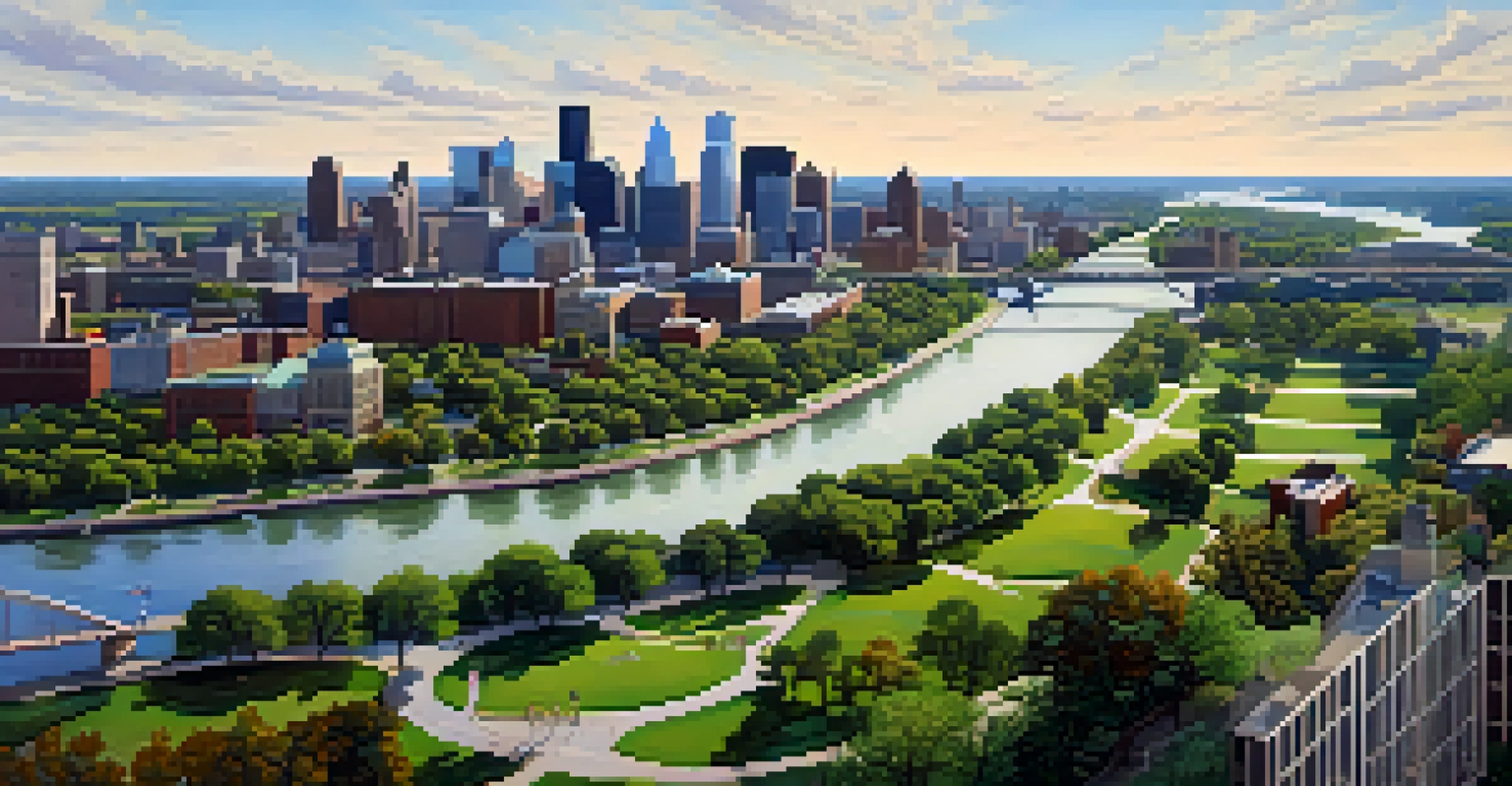The Impact of the Mississippi River on Minneapolis' Growth

The Mississippi River: A Lifeline for Early Settlers
The Mississippi River has long been a vital resource for those who made their home in Minneapolis. In the early 19th century, settlers recognized the river's potential for trade and transportation. It provided an essential route for moving goods, which was crucial for a burgeoning economy.
The Mississippi River is a lifeline for the communities it touches, shaping their economy, culture, and identity.
As people flocked to the area, the river helped establish Minneapolis as a key trading post. Grain mills sprang up along its banks, transforming the landscape and the livelihood of its residents. This transformation laid the foundation for the city's growth, making it a bustling hub of activity.
The river's presence not only facilitated commerce but also attracted a diverse population seeking opportunities. In this way, the Mississippi became a lifeline, nurturing the growth of a vibrant community that would flourish in the years to come.
Industrial Growth Fueled by the River's Power
The Mississippi River was instrumental in powering the industrial revolution in Minneapolis. The river provided the necessary waterpower to run mills and factories, which were essential for the city's economic expansion. This industrial boom created numerous jobs and attracted even more residents.

As industries flourished, the river became a bustling artery for transporting raw materials and finished products. This connectivity was vital for the growth of businesses ranging from textiles to flour mills. The Minneapolis economy became increasingly interwoven with the river's resources.
Economic Growth Driven by the River
The Mississippi River was essential for trade and industrial growth in Minneapolis, establishing the city as a key economic hub.
Moreover, this industrial growth transformed the city’s skyline and infrastructure. The river was not just a backdrop but a central character in Minneapolis' story, shaping its identity and the ambitions of its people.
Cultural Significance of the Mississippi River
Beyond its economic impact, the Mississippi River holds cultural significance for Minneapolis residents. It has been a source of inspiration for artists, writers, and musicians, who often draw from the river's beauty and vitality. The river's winding paths and scenic views create a picturesque setting that enhances the city's appeal.
The river is not just a waterway; it embodies the spirit and resilience of the people who live alongside it.
Community events and festivals celebrating the river foster a sense of belonging among residents. Activities such as fishing, boating, and riverside picnics bring people together, strengthening social bonds and promoting a shared appreciation for the natural environment. This cultural connection to the river enriches the city's identity.
Furthermore, the Mississippi serves as a reminder of the importance of nature in urban settings. It challenges residents to engage with their environment, emphasizing the need for stewardship and conservation efforts to preserve this precious resource for future generations.
Ecological Impact of Urban Development on the River
As Minneapolis grew, urban development inevitably took a toll on the Mississippi River's ecosystem. Industrial runoff and pollution posed significant threats to water quality and wildlife habitats. Over time, the river faced challenges that required attention and action from both the city and its residents.
Efforts to mitigate these impacts have led to initiatives aimed at restoring the river's health. Community organizations and government agencies have worked collaboratively to implement clean-up projects and promote sustainable practices. This collective effort showcases the city's commitment to preserving the river for future generations.
Cultural and Recreational Significance
The river serves not only as a source of community identity but also as a venue for recreational activities that enhance residents' quality of life.
The ecological challenges faced by the river also serve as a reminder of the importance of responsible urban planning. Minneapolis has the opportunity to balance growth with environmental stewardship, ensuring that the river remains a thriving ecosystem amid urban expansion.
The River as a Recreational Resource
The Mississippi River offers countless recreational opportunities that enhance the quality of life in Minneapolis. From kayaking and canoeing to biking along scenic trails, residents have ample ways to enjoy the river's beauty. These activities promote physical health and foster a sense of community among those who take part.
Parks and green spaces along the riverbanks provide a welcome escape from urban life. Families and individuals can be found picnicking, jogging, or simply enjoying the tranquil views. This connection to nature plays an essential role in promoting well-being and relaxation.
Moreover, the river's recreational potential supports local economies through tourism and outdoor activities. The vibrant atmosphere along the riverbanks attracts visitors, helping to sustain local businesses and create jobs. This synergy between recreation and the economy highlights the river's multifaceted role in the city.
The Mississippi River's Role in Community Identity
For many Minneapolis residents, the Mississippi River is intertwined with their sense of identity. It serves as a symbol of the city's history, growth, and resilience. The river not only shapes the physical landscape but also influences the community's spirit and values.
Local events, such as river clean-ups and educational programs, encourage residents to engage with their environment actively. These initiatives foster a sense of pride and responsibility, as the community comes together to care for their shared resource. Such efforts help solidify the bond between the river and its people.
Commitment to Ecological Preservation
Efforts to restore the river's health highlight Minneapolis' commitment to balancing urban development with environmental stewardship.
Ultimately, the Mississippi River is more than just a waterway; it represents the heartbeat of Minneapolis. It embodies the history, culture, and future aspirations of the city, reminding residents of their connection to both nature and one another.
Looking Ahead: The Future of the Mississippi River in Minneapolis
As Minneapolis continues to evolve, the Mississippi River will remain a crucial element of its future. Urban planners and community leaders are increasingly recognizing the importance of sustainable development that prioritizes the health of the river. This approach aims to preserve the river's ecological integrity while accommodating growth.
Innovative projects, such as riverfront redevelopment and green infrastructure, showcase the city's commitment to a balanced relationship with its waterways. These initiatives seek to enhance public access to the river while promoting environmental stewardship. The goal is to create a harmonious coexistence between urban life and nature.

Looking ahead, the ongoing dialogue about the river's role in the city will shape its future. As residents advocate for thoughtful development and conservation efforts, the Mississippi River will continue to be a source of inspiration, beauty, and vitality for generations to come.